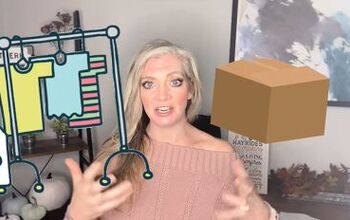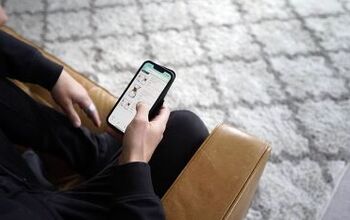How to Manage Emotional Spending (From a Recovering Emotional Spender)

Hello, my name is Jessica and I’m an emotional spender.
According to habits expert Gretchen Rubin there are two types of people; over-buyers and underbuyers. The over buyers amongst us default to buying stuff on a whim to feel better about ourselves where as under-buyers veer towards deprivation and can easily take an age to talk themselves into buying even the basic necessities. Which one are you? Without a shadow of a doubt I am an over-buyer. Always have been and sadly people don’t change overnight. I learnt to shop my feelings as a way of soothing myself at an early age, and I know I’m not alone.
Old habits die hard, and hard wired patterns can become so engrained in us that no matter how much we grow, when life takes an inevitable turn for the worse we revert right back to those coping mechanisms we developed in our early life despite how toxic, damaging or unhealthy they are. That sweet rush of dopamine shopping can give remains as intoxicating as ever. The advertising industry thrives on those like me and we’re prayed upon regularly making financial wellbeing all the more difficult to manage, especially in times of personal struggle.
Before I go on it feels important to point out I’ve accepted I will never be a ‘frugal liver’ and this isn’t my goal. I hold no judgement towards those who enjoy frugal living but it simply isn’t for me. I tried it and found no joy in it. I love beautiful things, believe we deserve to enjoy luxuries in life and curating aesthetics is part of who I am. Living frugally felt like deprivation to me whenever I tried it. Having said that maximalism didn’t exactly serve me well either. Out of control spending, mounting debts and overflowing storage only caused me stress. The answer then, lies somewhere in between the two extremes. But how do we find the balance?
I’m in a much better place with my emotional spending these days but as soon as I find myself spiralling into a well of negative emotions you can bet I’m right back wandering lifestyle stores, scrolling my favourite brands on Instagram and filling up my imaginary dream cart on Cult Beauty, then feeling oh so tempted to think **** it and buy the lot without even checking my bank account. Thankfully I’ve learnt to be a more intentional shopper over the years and resist temptations. Learning to manage my emotional spending tendencies has benefitted my wallet, mental health and life in general.
Aside from the issues around sustainability, decreasing space in our homes and the negative effects meaningless spending has on our mental health, with the day to day cost of living increasing so rapidly it’s becoming more important and necessary than ever to shop intentionally.
As such, here are eight ways I’ve learned to curb my own emotional spending over the years. If you share the same struggles as me I’m hoping they’ll serve you just as well.
Raise awareness
Holding up a mirror and coming face to face with ourselves from an objective viewpoint is the first step to making any kind of sustainable change. The more aware we are of our behaviour, our patterns and way of thinking the more we can understand ourselves, extend some much needed compassion and re-parent ourselves so we’re acting in a way that benefits our long term satisfaction as opposed to constantly seeking instant gratification. A journal is a great way to start raising awareness. At the end of each day note down when you felt tempted to spend money, what happened leading up to that moment, how you felt and the consequences of your behaviour. You’ll naturally find yourself piecing the puzzle together and making connections which will enable you to intervene when you find yourself in a familiar situation next time. The beauty of self-awareness is once you’ve switched it on you cannot switch it off.
Focus on managing emotions over managing finances
This is the equivalent of treating the cause instead of the symptom. Taking steps to positively improve finances is of course great but when you’re an emotional impulsive spender, learning to process your emotions in a healthy way will make life a lot easier for you and your finances because you won’t want to spend as much. Looking after our emotional wellbeing through self-care like self-compassion, will fill a hole that we’re turning to emotional spending to fill. Spoiler alert, no amount of sending will ever make you feel good enough or better for a significant amount of time. There is no substitute to being able to emotionally soothe yourself and trying to get to this place is worth the endeavour. The consumer industry is built on this fact and this is why there is no end to the amount of things you think you must buy even if the urge subsides for a while. The entire system is rigged to be as addictive as possible.
Start asking questions
Asking ourselves some basic questions before we make a purchase is a great way to slow ourselves down and the the more we can slow ourselves down in the buying process the better. We cannot be too curious, especially when it comes to our emotions. Before you head to checkout take a few seconds to ask yourself do I really need this? Do I even want this? What value is this adding? Is this a want or a need? These are all great minimalist favourites to place a buffer in between your knee-jerk reaction to buy the shiny thing without thinking it through.
Learn to enjoy simplicity
Keeping it simple is one of my fundamental rules in life. I feel like before I experimented with a simple living I had everything the wrong way around. I thought the more my life was filled with beautiful things, expensive trips and stereotypical luxuries the happier and more successful I would feel - I wonder where I got that idea? How wrong I was. The less we have the more we appreciate what we do have and the more valuable it becomes. Consumerism tricks us into believing we want more but what we really want is meaning and this cannot come from a life stuffed with the meaningless.
Track spending
This is another step to raising awareness and one of the simplest ways to get better with money. Coming face to face with what you’re actually spending can be the wake up call you need to intervene. A spending tracker can be as basic as a notepad and paper or a note on your phone that you update every time you spend money, personally I like to keep tracking my spending as simple and old school as possible because it reinforces the amount I’m spending and can actually act as a deterrent because I can feel too lazy to write it down so I won’t even buy the thing. There are lots of great apps out there too. Experiment and find what works best for you.
The 48 hour rule
This is my personal favourite. As I said I don’t respond to deprivation very well, hence why frugal living never worked out. Feeling deprived only seems to increase my want of something - like telling someone not to think of an elephant means they’ll definitely think of an elephant. Reassuring myself I can have whatever I want I just have to wait however works a treat. It allows time for emotions to pass, my brain to realise I don’t even want something or I’d be better off with something else that will actually last longer. If you really want something and providing it isn’t an emergency requirement make yourself wait two days before buying it. If you’ve gone this long without it you can go another two days. A lot can change in that time and you may not feel the same way in 48 hours. You’re not depriving yourself altogether so it doesn’t feel too restrictive, you’re just placing a hold on things so you can think it through.
Make spending as inconvenient as possible
Unsubscribe from newsletters (yes this is a pain but after a few weeks of unsubscribing every time you get one you’ll start seeing the difference), unfollow brands on Instagram, don’t watch haul videos on YouTube if they’re the thing that trigger you. Don’t save your card details in Amazon, Apple Pay or any of your favourite sites. The more motions you have to go through to spend money the better because the more chances your brain has to catch up with what’s actually going on here giving you a chance to stop what you’re doing and ask a few questions. Brands want to make it as easy for you to spend as possible so it’s up to us to put the barriers in place. When you do make a purchase it will feel so much more intentional and all the sweeter for it.
Do something else instead
The best way to kick a habit is to replace it with something else, preferably a healthier one. This is brain hacking at it’s finest. Swapping one bad habit for another doesn’t solve the numbing feelings pattern altogether but it will save your wallet. Go walking instead of online shopping, pick up the phone and have a deep meaningful conversation with a friend or family member, make something, write, clean the house, dance around your kitchen like a maniac. Dopamine can be sought from lots of different sources aside from spending, you just have to know where to look.
Are you an emotional impulsive spender too? How do you deal with it? Share your secrets in the comments below.
If you’re feeling motivated to take control of your financed my ebook a simplified life has an entire section dedicated to simplifying finances regardless of income, budget or how you earn money. Feel free to wait 48 hours before you make a purchase.





















Comments
Join the conversation
Thank you for this article, which I saved. I am already doing many of the things you suggested...just wish I had come to this realization decades ago...when I still had my savings. But even at age 75, it's never too late. I lost everything I had in 2020 and have fought my way back emotionally to a place of comfort now. Increased awareness of emotional spending helped, but I also learned how deprivation and an empty apartment instead of a well furnished house lead to severe depression, overeating comfort foods, and becoming a reclusive introvert instead of the club joining, volunteering, Red Hat Society extrovert i used to be.
I have changed.
Life alone now has been an improvement...I am liking it and have regained my self confidance. Thank you again.
Great article!